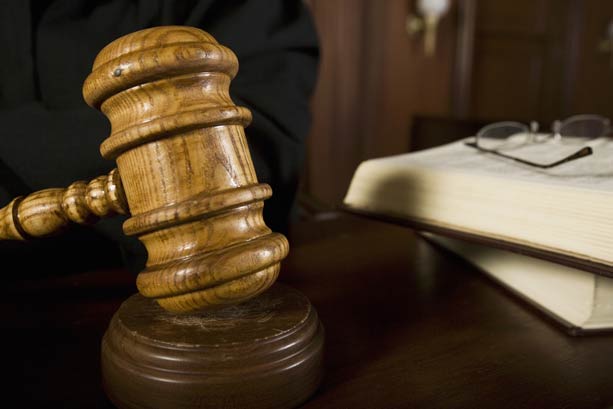
The justice system is no longer set up to provide an innocent man his day in court. It is a machine for producing plea bargains in industrial quantities.
It can operate no other way, because the volume of cases is far larger than the court system can actually handle. So instead of trials that take a long time and cost a lot of money but ideally separate the guilty from the innocent, we have become dependent on an assembly line where the accused go in at one end and come out the other a (relatively) short time later -- as convicted criminals, regardless of their guilt or innocence, but with shorter sentences than they would have faced if convicted at trial and with smaller lawyers' bills than they would have faced if they had gone to trial.
As this suggests, there are real benefits to the plea-bargaining system, even for the defendants. But there is a drawback as well.
In 1979, law professor Malcolm Freeley published "The Process Is the Punishment," a book in which he used the lens of the New Haven, Connecticut, court system to show the ways in which the trial itself -- as separate from any sentence imposed -- can function to punish people.
This can be a problem even if the defendant turns out to be guilty, but at least we have the option of compensating for this extra-judicial punishment by reducing the formal sentence. But when the system gets out of control, it produces Kafkaesque results even for guilty defendants: How many of us think that three years behind bars is the right sentence for the theft of a backpack?
And of course, when the defendant is innocent, this jail term is not merely excessive, but something close to a crime itself.
This is not what the machine was designed to produce.
The most obvious way to begin repairing this broken system is to spend more money building courtrooms and hiring judges, so that defendants actually do have a chance at their constitutionally guaranteed right to a speedy trial. We should also take a long, hard look at the number of things that are crimes, and the sentencing laws that require many crimes be requited with very harsh penalties.
Most our mass incarceration problem is a sentencing problem, driven by both mandatory minimums and prosecutors who are rewarded for being "tough on crime." These factors aggravate the flaws of the plea-bargaining system. Prosecutors can threaten to prosecute on draconian charges, which carry draconian sentences -- and all but force a defendant, even an innocent one, to take a plea bargain, with a lesser charge and a lesser sentence. Defendants (guilty and innocent alike) usually conclude that the risk of going to trial is simply too great. And the plea bargains, in turn, keep the machine from choking on the volume of cases being run through it. Instead it grinds out a very poor substitute for justice.
Reducing the number of laws and reducing the ability (or requirement) for prosecutors to secure serious jail time for so many offenses would reduce mass incarceration and start to unclog our court system. We should do these things. Unfortunately, they won't be enough.
While the popular picture among de-incarceration advocates is of prisons and courtrooms is of a system choked with nonviolent drug offenders, in fact, the system handles an immense amount of real, harmful crime. We're not going to decriminalize theft or assault or robbery, nor should we. If we really want a justice system that is not too overwhelmed to provide justice, we are going to have to focus on reducing crime.
Step one is to recognize and avoid the "solutions," like harsher sentences, that created the current problem. Instead we're going to have to spend the money and change the law to create a criminal justice system that can provide more intensive, but less impersonal, attention to crime and criminals.
Fortunately, there are ways to do this. Mark Kleiman of NYU, who has taught me most of what I know about crime policy, wrote a brilliant book called "When Brute Force Fails," on the ways we can retool the justice system to actually reduce crime, rather than simply punishing it more harshly. Kleiman is liberal, but conservatives should have no fear: This is not a book about how we need loads more social spending and liberal policies to address the "root causes." This is a book about how we can police and punish more effectively. The sort of proposals that should be welcomed by left and right alike.
Kleiman's ideas and insights are too many to sum up in a column, so I'll focus on a core observation: Bad policing, and bad prison policy, can create more crime. Our current justice system provides what Kleiman calls "randomized draconianism": Your odds of getting caught and punished are not very high, but if you are caught, you'll get treated very harshly. The likelihood of punishment is so low that there is no deterrent effect to prevent crime, and the severity of punishment is so harsh that it may simply make those who are caught more likely to commit further crimes.
Putting people in jail cuts them off from their families, deprives them of any opportunity to get integrated in the non-criminal economy, and oh yes, introduces them to many criminals with whom they can pursue future crime-related business opportunities. Our current system seems almost purpose-built to create a large class of disaffected people who commit a lot of crime.
What's the alternative? Raise the odds of punishment, and lower the severity. That means more police on the streets, focused on steadily reducing crime hot-spots and making it unattractive to take up a life of crime in the first place. It means probation and parole systems that provide much more intensive monitoring, but use lighter sanctions like a night or two in jail, rather than revoking someone's parole and sending them back to prison for five years. It means exploring new technologies that allow us to put people under "house arrest" of varying intensity.
In the short term, this will mean spending more money and effort on the system. But there's good news: Prison is so expensive that even many expensive programs can save money on net if they keep people out of long prison terms.
Better still, effective reforms may reduce recidivism, so that we can spend less money on all these things in the future.
And best of all, the innocent majority in the U.S. who do not commit crimes will experience safer communities and less fear -- less fear of criminals, and less fear of one day being caught up in a system that so often punishes the innocent along with the guilty.
Megan McArdle is a Bloomberg View columnist who writes on economics, business and public policy. She is the author of "The Up Side of Down." McArdle previously wrote for Newsweek-the Daily Beast, the Atlantic and the Economist.


 Contact The Editor
Contact The Editor
 Articles By This Author
Articles By This Author